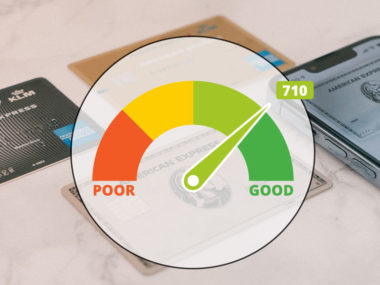A 661 credit score is considered Fair according to Experian, one of the leading credit bureaus, which relies on the FICO scoring model. Nearly 70% of Americans have scores higher than 661, meaning the score is in the lower brackets. FICO’s official classifications of credit scores are as follows:
- 300 to 579: Very Poor;
- 580 to 669: Fair;
- 670 to 739: Good;
- 740 to 799: Very Good;
- 800 to 850: Exceptional.
A credit score of 661 is on the edge between Fair and Good, meaning that borrowers with this score can easily leap from one classification to the next if they devote effort to improving their score.
Checking your credit score is the first step of many to increase your score. This article will help you know which steps to take to increase a 661 credit score to the mid 700s within a few years.
Table of Contents
Why Your Credit Score Is 661
With a credit score of 661, you likely have several delinquent accounts, late payments, and other negative marks affecting your credit history. Here are some of the possible reasons why your credit score dropped to 661.
Delinquent Accounts
The term “delinquent account” refers to an account with unpaid monthly debts older than 30 days. Your payment history makes up about 35% of your credit history, meaning that having delinquent accounts can drop your credit score by nearly 100 points.
To remedy a credit history with delinquent accounts, begin paying off your debts as soon as possible. Delinquencies have the potential to remain on your account for more than seven years, making it a priority for borrowers to make their payments before the account becomes delinquent.
High Credit Utilization
Credit utilization, the percentage of credit currently used on your account, can affect up to 30% of your credit score. Credit experts recommend that accounts use less than 30% of their credit limit, though some credit cards require even less. VISA will begin to dock your credit score if you surpass 17% of your credit limit.
To remedy an account with high credit utilization, begin by lowering your credit usage. You can lower it by either increasing your credit limit or paying off the debts on your accounts. However, some credit agencies won’t approve a request to increase your credit limit if your current credit score is Fair or Very Poor.
Brief Credit History
Accounts with Very Good credit scores often have long credit histories, while accounts with poor credit scores often have short credit histories. The length of your credit history can affect up to 15% of your credit score.
When repairing your credit score, don’t close old accounts. Your older accounts add length to your credit history and will help repair your credit score faster. In most cases, an account needs to be open for seven years before it begins contributing positively to your credit score.
What Can You Do With a 661 Credit Score?
You do have some borrowing options if you have a 661 credit score, but at the same time, you should avoid taking on additional debt.
Taking on more debt can decrease your credit score further and make it harder to get loans or good credit cards in the future. If you need to take out a loan or get a new credit card, here are your options.
FHA Loan
An FHA loan is a government mortgage loan through an FHA-approved lender. They were created specifically for borrowers with low incomes or low credit scores and are available to borrowers with 661 credit scores. With a 661 credit score, you can take out an FHA loan with a 3.5% down payment.
Store Credit Card
Stores are fairly lenient with their credit cards and require that the borrower has at least a 640 credit score. With a 661 credit score, you should be approved for the store credit card of your choice. Many store credit cards offer in-store rewards but often have elevated interest rates.
Personal Loan
There are several personal loans for bad credit. These loans are created for borrowers with limited credit scores and are even available to those with a bankruptcy on their credit history.
Most bad credit loans have high interest rates to compensate for the lender’s risk. With a bad credit personal loan, you can expect an interest rate between 28.5% and 32%.
No-Annual-Fee Credit Card
For low spenders, using a credit card with an annual fee is impractical. Luckily, you should qualify for a no-annual-fee credit card with a credit score of 661. However, you might not be eligible for a no-annual-fee card that doubles as a rewards credit card since rewards cards often require the borrower to have Good credit.
How to Improve a 661 Credit Score
A borrower with a 661 credit score can easily increase their score from Fair to Good and likely won’t need a ton of help from a credit repair company. With consistent and dedicated effort, those with credit scores of 661 can repair their scores and become eligible for rewards and low interest rates. Here’s where to start.
Increase Account Diversity
Credit agencies reward accounts with high diversity because it shows that the borrower can handle a wide variety of debt without struggling. Most borrowers with 661 credit scores have two types of accounts, though experts recommend that borrowers have four types of accounts. Account types include:
- Installment loans;
- Mortgage loans;
- Retail credit cards;
- Bank credit cards;
- Rental data.
Having four loan types will increase your account diversity and earn investors’ trust. However, there are caveats — don’t take on more loans than you can handle. If you take on too many loans, account diversity can backfire, and your unpaid debt could decrease your score further.
Decrease Utilization
A recurring issue for those with 661 credit scores is high utilization. As mentioned earlier in the article, credit experts recommend that borrowers keep their utilization well below 30%. When utilization creeps above 30%, your credit score suffers.
To decrease your utilization, start by paying off portions of your debt. For example, if you have a credit limit of $5,000, never spend more than $1,500 across all your accounts. Lowering your utilization rate will help improve your credit score.
On-Time Payments
The most important factor playing into low credit scores is payment history. To increase your credit score, make sure that you never miss a payment.
Most credit agencies allow you to set up automatic payments to ensure that payments are sent in before the deadline each month. Credit experts highly recommend that you set up automatic payments on all your credit accounts.
Setting up autopay shouldn’t be the end. Every month, check in with your accounts to make sure that your autopay went through. If it didn’t, you’ll still be able to pay before your account becomes delinquent.
Image Source: https://depositphotos.com/





